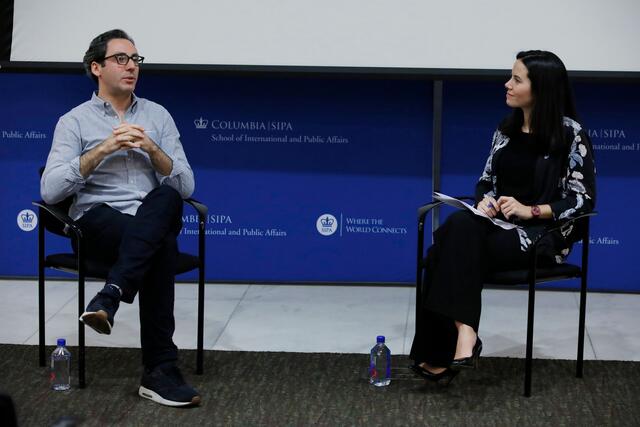
Warby Parker Co-Founder Discusses Entrepreneurship with a Social Mission

One billion people in the world don’t have access to eyeglasses.
That’s the statistic that led Neil Blumenthal to co-found Warby Parker, the e-commerce eyeglasses retailer now valued at $1.2 billion.
Blumenthal, who today is the company’s CEO, visited SIPA on January 28 to explain “How We Turned $120,000 Into a Billion-Dollar Eyeglass Brand.” The lecture was sponsored by SIPA’s Management specialization; specialization director Sarah Holloway introduced Blumenthal, and Inés Dionis MPA ’19 mediated a Q&A session following his remarks.
After graduating from Tufts, where he studied conflict resolution, Blumenthal — a native of New York City — was connected to a doctor running a program that trained low-income women to give vision screenings and sell eyeglasses.
The next thing he knew, Blumenthal said, he was working with a foundation doing the same work in El Salvador, where he first learned that fashion matters.
“No matter where you live, you care about your appearance,” he said.
The idea to turn this nonprofit idea into a private company came while Blumenthal was enrolled in an MBA program at Penn’s Wharton School. His friend (and eventual co-founder) Dave Gilboa was complaining about losing a $700 pair of glasses on a plane. As a banker, before he attended business school, Gilboa could easily afford a new pair; as an ex-banker and current student, his circumstances were a little different.
As Blumenthal recounted, e-commerce was just beginning to take off at that time, but no one had tried selling glasses online yet. And so the idea cutting out the middleman — the distributor — in order to sell less expensive glasses was born.
The idea was tested for a year at Wharton, where the founders flooded their fellow students with focus groups.
“The ecosystem [at graduate school] is great for building a business,” said Blumenthal. “Entrepreneurship is about testing in a proactive way.”
Testing and experimentation became a core value of the company that would become Warby Parker, Blumenthal said.
In their first rounds of testing, the founders developed what became the central tenets of Warby Parker’s business model. They quickly discovered that prospective customers wanted to interact with the product before buying. This led to the practice for which Warby Parker became known — giving customers the chance to try on five pairs of glasses at home.
A mentor at Wharton suggested that customers would perceive their planned price of $45 as low-quality and cheap. After determining that people were equally willing to spend $100 for a pair of glasses, the team ultimately landed on $95.
But the founders also never forgot their nonprofit roots. From the beginning, for every pair of glasses Warby Parker sold, the company donated to those in need.
Almost immediately, Warby Parker’s social mission got attention. GQ and Vogue magazines came knocking, each seeking to do a piece on the internet e-tailer with a cause.
Blumenthal, Gilboa, and two other co-founders launched Warby Parker in 2010 amid a flurry of great press. Within 48 hours, they had run out of inventory of the try-on sets. They hit their first-year sales goal easily.
From there, Warby Parker only grew. The company expanded quickly to brick-and-mortar stores, opening up their first showroom in Blumenthal’s Philadelphia apartment, using his wife’s mirror. After discovering a shortage of optometrists, Warby Parker started offering screening done entirely on personal screens, phones, and computers.
By 2018, Warby Parker was valued at $1.2 billion.
To Blumenthal, the company’s social mission and profit goals have always been intrinsically linked. It was obvious, however, that to successfully scale both, they couldn’t do everything.
Instead of managing the a nonprofit and private company at the same time, Warby Parker started partnering with outside nonprofits, like VisionSpring, to provide funding. This took the fundraising burden off of the nonprofit partners and allows them to devote more time to the cause. At home in New York, where the company is headquartered, they have partnered with the office of the mayor to provide screenings and glasses to all New York City kindergarteners.
Blumenthal’s message to entrepreneurial SIPA students is to know their brand and customer base — to “test, test, test” and be driven by a clear purpose and mission.
“We believed in the power of brands to influence culture and society. Brands can stand for something much more than the individual product.”
— Claire Teitelman MPA ’19